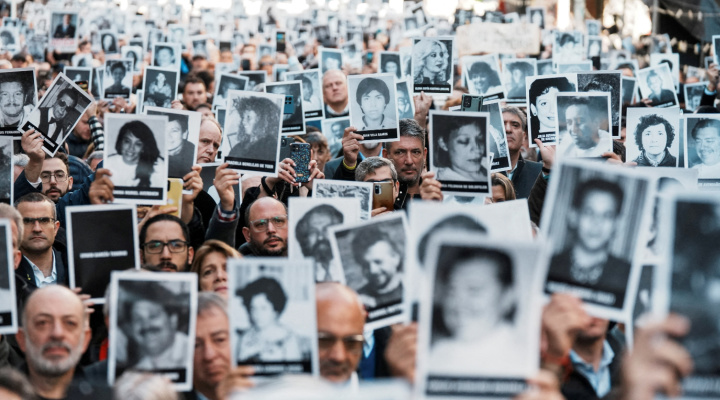People hold images of the victims of the 1994 bombing attack on the Argentine Israeli Mutual Association (AMIA) community center, marking the 30th anniversary of the attack, in Buenos Aires, Argentina, July 18, 2024. Photo: REUTERS/Irina Dambrauskas
Iran on Friday marked the 31st anniversary of the 1994 bombing of the Argentine Israelite Mutual Association (AMIA) Jewish community center in Buenos Aires by slamming Argentina for what it called “baseless” accusations over Tehran’s alleged role in the terrorist attack and accusing Israel of politicizing the atrocity to influence the investigation and judicial process.
The Iranian Foreign Ministry issued a statement on the anniversary of Argentina’s deadliest terrorist attack, which killed 85 people and wounded more than 300.
“While completely rejecting the accusations against Iranian citizens, the Islamic Republic of Iran condemns attempts by certain Argentine factions to pressure the judiciary into issuing baseless charges and politically motivated rulings,” the statement read.
“Reaffirming that the charges against its citizens are unfounded, the Islamic Republic of Iran insists on restoring their reputation and calls for an end to this staged legal proceeding,” it continued.
Last month, a federal judge in Argentina ordered the trial in absentia of 10 Iranian and Lebanese nationals suspected of orchestrating the attack in Buenos Aires.
The ten suspects set to stand trial include former Iranian and Lebanese ministers and diplomats, all of whom are subject to international arrest warrants issued by Argentina for their alleged roles in the terrorist attack.
In its statement on Friday, Iran also accused Israel of influencing the investigation to advance a political campaign against the Islamist regime in Tehran, claiming the case has been used to serve Israeli interests and hinder efforts to uncover the truth.
“From the outset, elements and entities linked to the Zionist regime [Israel] exploited this suspicious explosion, pushing the investigation down a false and misleading path, among whose consequences was to disrupt the long‑standing relations between the people of Iran and Argentina,” the Iranian Foreign Ministry said.
“Clear, undeniable evidence now shows the Zionist regime and its affiliates exerting influence on the Argentine judiciary to frame Iranian nationals,” the statement continued.
In April, lead prosecutor Sebastián Basso — who took over the case after the 2015 murder of his predecessor, Alberto Nisman — requested that federal Judge Daniel Rafecas issue national and international arrest warrants for Iran’s Supreme Leader Ayatollah Ali Khamenei over his alleged involvement in the attack.
Since 2006, Argentine authorities have sought the arrest of eight Iranians — including former president Ali Akbar Hashemi Rafsanjani, who died in 2017 — yet more than three decades after the deadly bombing, all suspects remain still at large.
In a post on X, the Delegation of Argentine Israelite Associations (DAIA), the country’s Jewish umbrella organization, released a statement commemorating the 31st anniversary of the bombing.
“It was a brutal attack on Argentina, its democracy, and its rule of law,” the group said. “At DAIA, we continue to demand truth and justice — because impunity is painful, and memory is a commitment to both the present and the future.”
31 años del atentado a la AMIA – DAIA. 31 años sin justicia.
El 18 de julio de 1994, un atentado terrorista dejó 85 personas muertas y más de 300 heridas. Fue un ataque brutal contra la Argentina, su democracia y su Estado de derecho.
Desde la DAIA, seguimos exigiendo verdad y… pic.twitter.com/kV2ReGNTIk
— DAIA (@DAIAArgentina) July 18, 2025
Despite Argentina’s longstanding belief that Lebanon’s Shiite Hezbollah terrorist group carried out the devastating attack at Iran’s request, the 1994 bombing has never been claimed or officially solved.
Meanwhile, Tehran has consistently denied any involvement and refused to arrest or extradite any suspects.
To this day, the decades-long investigation into the terrorist attack has been plagued by allegations of witness tampering, evidence manipulation, cover-ups, and annulled trials.
In 2006, former prosecutor Nisman formally charged Iran for orchestrating the attack and Hezbollah for carrying it out.
Nine years later, he accused former Argentine President Cristina Fernández de Kirchner — currently under house arrest on corruption charges — of attempting to cover up the crime and block efforts to extradite the suspects behind the AMIA atrocity in return for Iranian oil.
Nisman was killed later that year, and to this day, both his case and murder remain unresolved and under ongoing investigation.
The alleged cover-up was reportedly formalized through the memorandum of understanding signed in 2013 between Kirchner’s government and Iranian authorities, with the stated goal of cooperating to investigate the AMIA bombing.
The post Iran Marks 31st Anniversary of AMIA Bombing by Slamming Argentina’s ‘Baseless’ Accusations, Blaming Israel first appeared on Algemeiner.com.
Click this link for the original source of this article.
Author: Ailin Vilches Arguello
This content is courtesy of, and owned and copyrighted by, https://www.algemeiner.com and its author. This content is made available by use of the public RSS feed offered by the host site and is used for educational purposes only. If you are the author or represent the host site and would like this content removed now and in the future, please contact USSANews.com using the email address in the Contact page found in the website menu.








